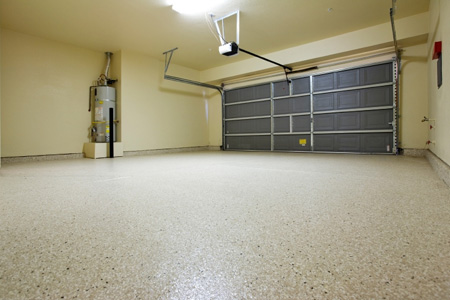During, commercial or institutional construction, your choice of building materials can have far-reaching effects. This is especially true when it comes to the flooring in locations where chemicals are regularly used or stored, and where spilled substances can lead to floor degradation.
For example, in the event of a splash or spill, many acids can cause serious damage to standard floor coverings as well as to the concrete slab itself. Protective products do exist that can help prevent this type of degradation—how can you know if you should use a high performance acid-resistant coating on your floor?
Determine the Risk of Degradation
As you analyze the corrosive effects that specific manufacturing and other operations can have on a facility’s concrete floors, many different factors come into play.
First and foremost is chemical resistance. Food and beverage production, machining and extrusion, assembly and maintenance facilities, as well as data centers, research laboratories, medical facilities and many others experience corrosive materials making contact with flooring on a regular basis.
From the citric acid, sugars and salts of food processing to the hydrochloric acid of metal works, from the sulfuric acid in battery storage rooms to the corrosive solvents in maintenance facilities, the list of potentially damaging chemicals can seem almost endless.
Even the products used to clean or sanitize facility floors present a threat to the condition and safety of floors, especially because these chemicals come into direct contact with the surface across larger areas and for a longer period of time.
In order to determine the need for acid-resistant coatings, you’ll want to learn more about how exposure to acidic substances and other chemicals can affect the integrity of a concrete floor.
How Do Acidic Substances Corrode Concrete Flooring?
Concrete is comprised of a mix of Portland cement and various aggregates, and is an inherently porous material. This porous nature enables liquids to enter the matrix of the floor slab when left unprotected.
When chemicals known to be corrosive to concrete are allowed to soak into and through your uncoated floor slab, you’re asking for expensive repairs in a matter of weeks or months.
For example, acids tend to dissolve the cement compounds as well as certain (calcareous) aggregate in concrete. On the other end of the pH scale, salts and alkalis can be equally damaging to Portland cement — various types of chlorides and nitrates can cause severe concrete deterioration.
Moreover, the temperature of these substances can also influence their effect. For example, hot temperature cleaning with harsh alkaline sanitizers in food plants increases the chance for concrete floor damage. As a rule, general service floor coverings and coatings can withstand neither the intense chemical exposure nor the thermal shock.
Extreme temperature swings, even without the presence of corrosive chemicals, can cause cracking, disbondment or even melting of standard commercial floor surfaces. Add high alkalinity or acidity to the mix and without the proper flooring protection, you’ve got yourself a flooring repair or replacement bill.
How Floor Corrosion Can Affect Health and Safety
Beyond the unsightly appearance and restoration costs, your floor’s corrosion can create serious health and safety issues within the facility. Cracks, unevenness and potholes increase the risk of trip/fall events and can also damage carts, forklifts and other movable equipment.
Corroded floor surfaces made porous by repeated exposure to acids and chemicals, as well as cracks and other breaches in your floor’s monolithic surface, help create the perfect dark, damp environment for microbes, molds and pathogens to proliferate. Needless to say, visiting inspectors from local health and safety regulatory agencies do not look kindly upon such conditions.
The adulteration hazards to products being processed within the facility as well as to employees’ and visitors’ health and safety can be significant. Eradication of a microbe infestation, once established within a concrete slab, can be near impossible without complete slab replacement.
Luckily, there are some simple, economically sound steps you can take to help protect your facility and project from this kind of exposure.
How Can You Protect Your Project’s Facility Floor?
Like other informed construction managers, designers and facility owners today, you’ll find that the world of resinous, fluid-applied flooring offers value-based chemical-, acid-, and alkali-resistance as well as thermal-shock resistant options perfectly suited to your project.
Well-specified, high performance floor systems can be designed and installed to meet your project’s specific needs, including compliance with OSHA, ADA, EPA, USDA and FDA requirements or guidelines.
Correctly selected acid-resistant epoxy, thermal shock-withstanding cementitious urethane or other resinous system can help safeguard your industrial floors, institutional and commercial facility, standing up to harsh conditions day after day, year after year.
By helping prevent the corrosion and damage of your concrete slab, you also get points for sustainability and budget savings. The floor surface and slab will provide a longer usable life, minimizing future repair or replacement costs and accompanying downtime.
Are Acid Resistant Floor Coatings Right for Your Project?
Even when armed with information, it can be difficult to determine whether or not acid-resistant floor coatings are appropriate for your project — and if so, to choose the most suitable system for the facility environment and budget.
A quality resinous flooring manufacturer is your best source of advice. A factory technical representative can assist you with floor system selection and connect you with a manufacturer-approved installation contractor.
Acid-resistant floor coatings and other specialty resinous systems can protect your concrete slab in some of the harshest conditions, saving you and your client headaches, business downtime, significant costs over the long term. Find out if high performance flooring is right for your facility project today.

